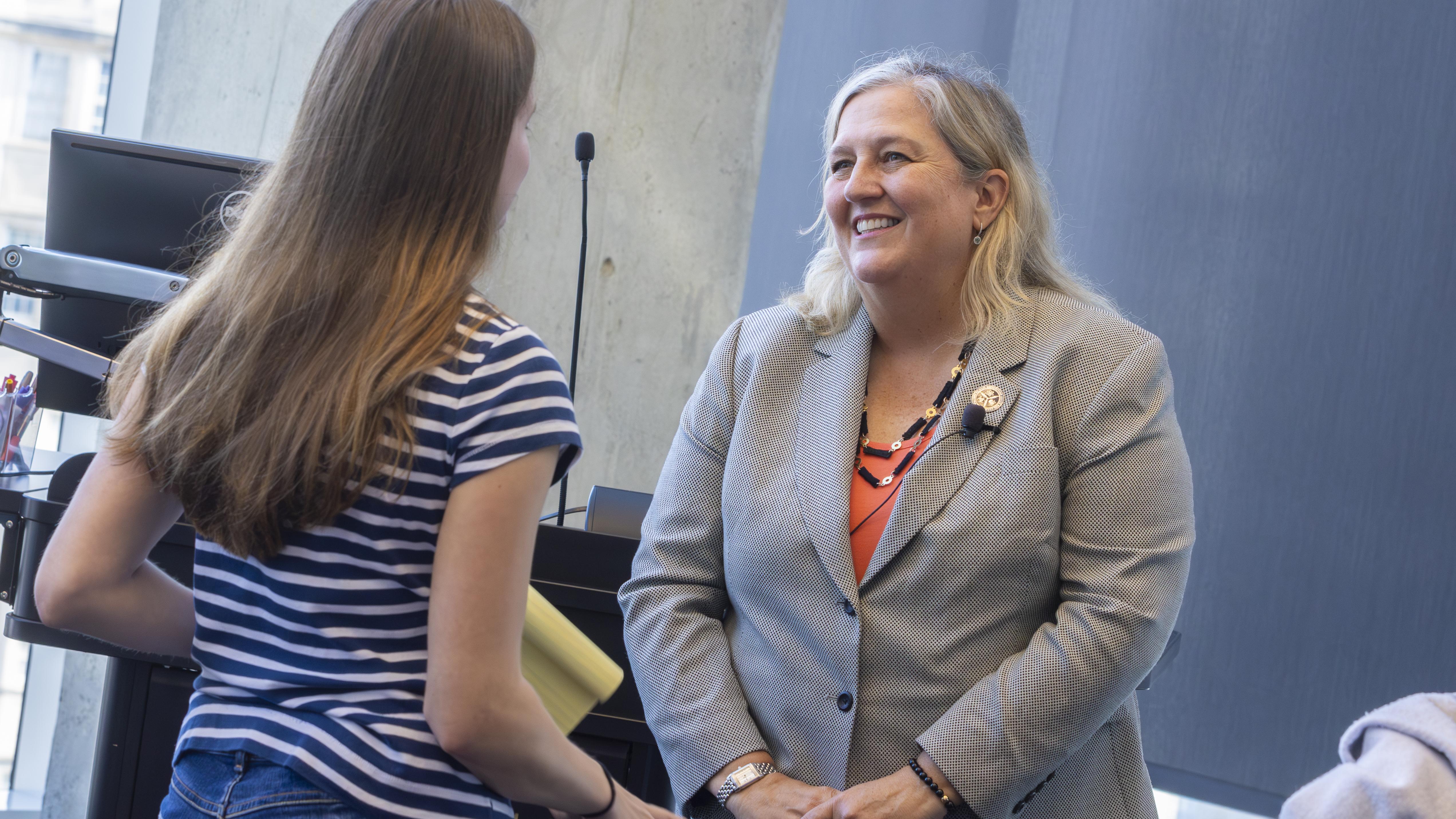
Counter WMD Official Shares How She Prepares for America’s Worst Day
Even though artificial intelligence (AI) is not advanced enough to help the average person build weapons of mass destruction, federal agencies know it could be possible and are keeping pace with next generation technologies through rigorous research and strategic partnerships.
It is a delicate balance, but as the leader of the Department of Homeland Security (DHS) Countering Weapons of Mass Destruction Office (CWMD) told a room full of Georgia Tech students, faculty, and staff, there is no room for error.
“You have to be right all the time, the bad guys only have to be right once,” said Mary Ellen Callahan, assistant secretary for CWMD.
As a guest of John Tien, former DHS deputy secretary and professor of practice in the School of Cybersecurity and Privacy as well as the Sam Nunn School of International Affairs, Callahan was at Georgia Tech for three separate speaking engagements in late September.
"Assistant Secretary Callahan's contributions were remarkable in so many ways,” said Tien. “Most importantly, I love how she demonstrated to our students that the work in the fields of cybersecurity, privacy, and homeland security is an honorable, interesting, and substantive way to serve the greater good of keeping the American people safe and secure. As her former colleague at the U.S. Department of Homeland Security, I was proud to see her represent her CWMD team, DHS, and the Biden-Harris Administration in the way she did, with humility, personality, and leadership."
While the thought of AI-assisted WMDs is terrifying to think about, it is just a glimpse into what Callahan’s office handles on a regular basis. The assistant secretary walked her listeners through how CWMD works with federal and local law enforcement on how to identify and detect the signs of potential chemical, biological, radiological, or nuclear (CBRN) weapons.
“There's a whole cadre of professionals who spend every day preparing for the worst day in U.S. history,” said Callahan. “They are doing everything in their power to make sure that that does not happen.”

CWMD is also researching ways to implement AI technologies into current surveillance systems to help identify and respond to threats faster. For example, an AI-backed bio-hazard surveillance systems would allow analysts to characterize and contextualize the risk of potential bio-hazard threats in a timely manner.
Callahan’s office spearheaded a report exploring the advantages and risks of AI in, “Reducing the Risks at the Intersection of Artificial Intelligence and Chemical, Biological, Radiological, and Nuclear Threats,” which was released to the public earlier this year.
The report was a multidisciplinary effort that was created in collaboration with the White House Office of Science and Technology Policy, Department of Energy, academic institutions, private industries, think tanks, and third-party evaluators.
During his introduction of assistant secretary, SCP Chair Michael Bailey told those seated in the Coda Atrium that Callahan’s career is an incredible example of the interdisciplinary nature he hopes the school’s students and faculty can use as a roadmap.
“Important, impactful, and interdisciplinary research can be inspired by everyday problems,” he said. "We believe that building a secure future requires revolutionizing security education and being vigilant, and together, we can achieve this goal."
While on campus Tuesday, Callahan gave a special guest lecture to the students in “CS 3237 Human Dimension of Cybersecurity: People, Organizations, Societies,” and “CS 4267 - Critical Infrastructures.” Following the lecture, she gave a prepared speech to students, faculty, and staff.
Lastly, she participated in a moderated panel discussion with SCP J.Z. Liang Chair Peter Swire and Jerry Perullo, SCP professor of practice and former CISO of International Continental Exchange as well as the New York Stock Exchange. The panel was moderated by Tien.


